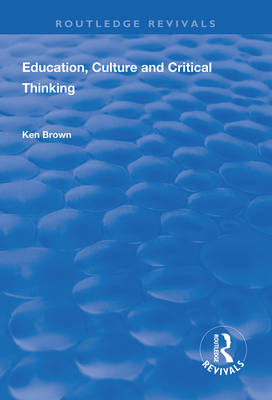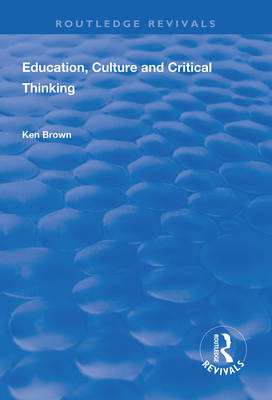
- Retrait gratuit dans votre magasin Club
- 7.000.000 titres dans notre catalogue
- Payer en toute sécurité
- Toujours un magasin près de chez vous
- Retrait gratuit dans votre magasin Club
- 7.000.0000 titres dans notre catalogue
- Payer en toute sécurité
- Toujours un magasin près de chez vous
Description
Published in 1998. Interest in the subject of "critical thinking" has mounted, seeking ways to transcend rote learning and to remedy a widely perceived lack of critical, analytical abilities amongst school students. A growing literature on "teaching thinking" and "problem solving" maintains this commitment, reflecting a common belief that thinking skills of a general nature can not only be identified, but can be taught successfully. The paucity of empirical evidence that intellectual skills thus identified actually transfer between domains of thought or subject matters has done little to diminish faith in the possiblity that this is achievable. The principal message of this book is that theories of critical thinking which disregard its historical origins and dialectical, traditional character are likely to be seriously flawed. All human societies exhibit problem solving abilities, often of a high order - all language and thought is fundamentally criteriological. Relevant distinctions between critical thought and its alternative are found in history and culture, in dialogue and criticism, not just in the operations of individual minds.
The critical traditions embody a sovereign principle - a criterion of the effectiveness of educational institutions to represent the legacy and social liberties and democratic values in which they are deeply enmeshed.
Spécifications
Parties prenantes
- Auteur(s) :
- Editeur:
Contenu
- Nombre de pages :
- 202
- Langue:
- Anglais
- Collection :
Caractéristiques
- EAN:
- 9781138312777
- Date de parution :
- 30-06-20
- Format:
- Livre broché
- Format numérique:
- Trade paperback (VS)
- Dimensions :
- 150 mm x 216 mm
- Poids :
- 276 g

Les avis
Nous publions uniquement les avis qui respectent les conditions requises. Consultez nos conditions pour les avis.






